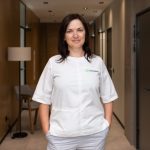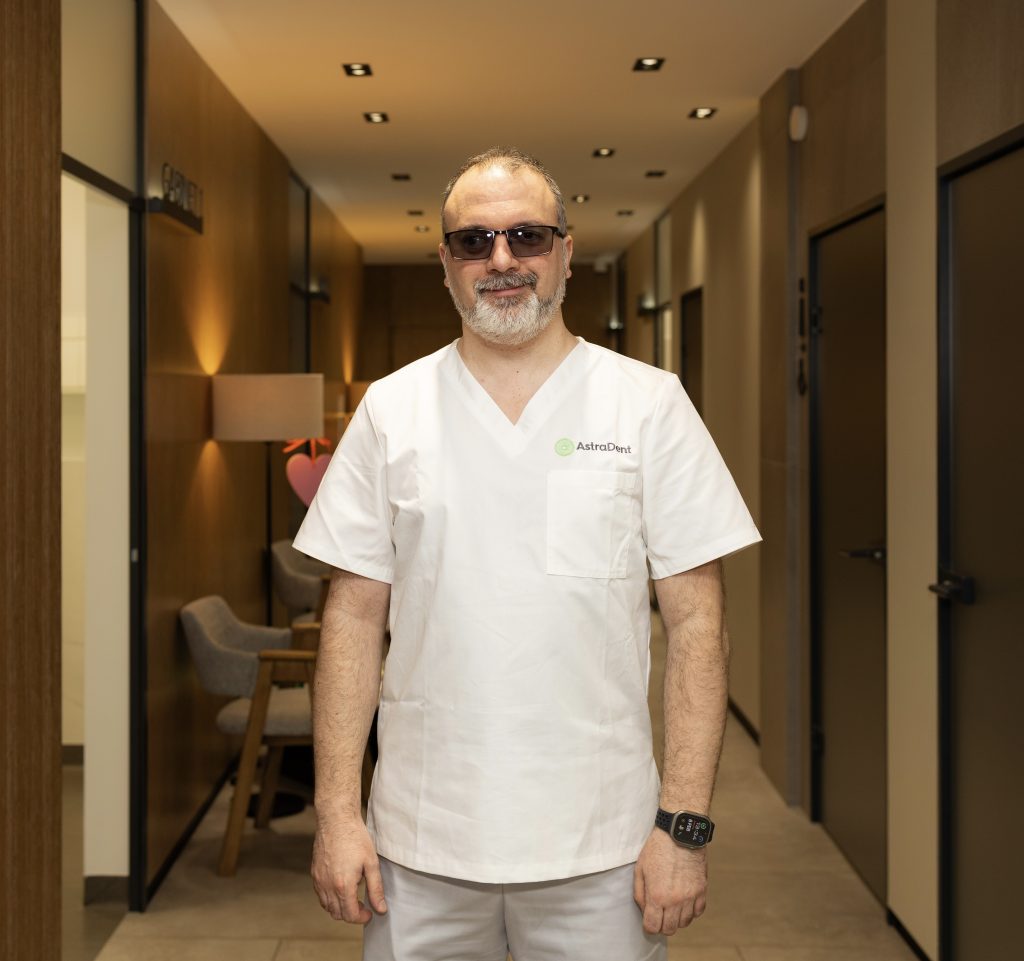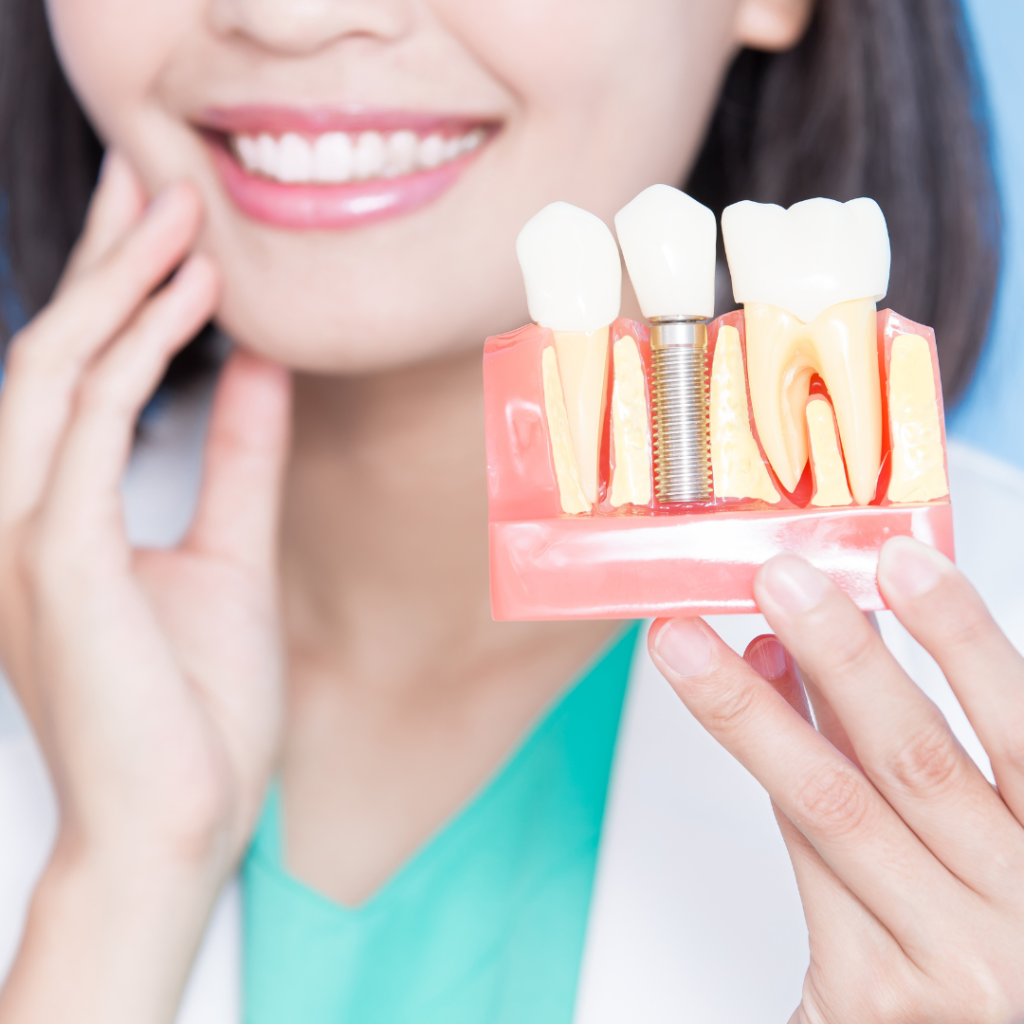Pain in the jaw and temples — what it can be and who to contact
Ordinary chewing, yawning, touching the face can suddenly cause shooting pain in the jaw, which radiates to the temple. Often the patient does not understand what exactly hurts – the teeth seem to be in order, but the discomfort does not go away. In such cases, the cause is not always obvious: it may be overload of the masticatory joint, hidden inflammation of the muscles or trigeminal neuralgia.
To determine the source of pain, it is necessary to conduct a comprehensive diagnosis. Astra Dent doctors analyze the position of the articular head, check the tone of the masticatory muscles, assess the bite and exclude inflammatory processes in the TMJ (temporomandibular joint). For this, digital panoramic images, TRG diagnostics are used, and in complex cases, CT with detailed visualization is recommended.
Pain in the temple or jaw cannot be ignored. If it recurs or intensifies during chewing, this is a signal that the joint or the musculoskeletal system is not coping with the load. In this case, it is better to contact not a therapist, but an orthopedic dentist or a doctor specializing in TMJ dysfunctions. At Astra Dent, such cases are considered multidisciplinary, with the participation of an orthodontist, surgeon, gnathologist and physiotherapist.
How does pain in the jaw and temples manifest itself
According to the US National Institute of Dental and Craniofacial Research (NIDCR), TMJ disorders occur in 5-12% of the population. This is a fairly high figure, given the complexity of diagnosis. The pain can be masked as a migraine, bite problems or the effects of stress. If the source of discomfort is not recognized in time, the situation becomes complicated to the point of limiting jaw mobility and chronic muscle spasm.
To assess symptoms, Astra Dent uses digital bite diagnostics, palpation of the masticatory muscles, analysis of the load on the joint through TRG or CT, special functional tests. This is how the following disorders usually manifest themselves:
- Pain in the jaw on one or both sides. It can be aching or squeezing, often worsens during chewing or talking. Most often associated with asymmetric load or inflammation in the joint.
- Tension in the temples. It occurs due to overload of the temporal muscle, which is involved in closing the jaw. It can radiate to the eye or neck, and worsens when the temple is touched.
- Clicking when opening the mouth. This is a sign of a slipped articular disc, when movement is accompanied by a characteristic sound that can be felt even with the fingers. In some patients, the click is periodic, but sometimes becomes regular and turns into a blockage of movement.
- Restriction of opening the mouth. The jaw does not open completely, movements are accompanied by pain or a feeling of "jamming". In such cases, the doctor measures the amplitude of opening and assesses whether there is joint dysfunction.
- Headache that begins in the temples. Most often appears in the morning or after prolonged stress on the facial muscles. May mimic a migraine, but the cause is overstrain of the temporomandibular complex.
- Pain after sleep or stress. Often associated with nocturnal bruxism – involuntary clenching of the jaws in a dream. In such cases, a diagnosis of muscle hypertonus is made and individual mouthguards are selected for unloading.
If you notice any of the above, you should consult a doctor. Most symptoms do not go away on their own. They are associated with the general condition of the masticatory system, which requires professional assessment.
Possible causes of pain
A feeling of stiffness in the jaw or slight discomfort in the temples is easy to miss. But if the pain recurs, intensifies after sleep, or is accompanied by a clicking sound when opening the mouth, the cause is most likely not superficial.
Astra Dent specialists regularly encounter patients who have ignored symptoms associated with muscle strain or temporomandibular joint dysfunction for a long time. In order not to miss the real cause, you need to look at the problem more broadly: the source of pain is not necessarily related to the teeth. Among the provoking factors are often:
- TMJ dysfunction. One of the most common diagnoses for pain in the temporomandibular joint. Mobility impairment, articular disc displacement, microtraumas – all this causes discomfort, clicking and limitation of mouth opening.
- Bruxism. In most cases, patients do not even suspect that they grind their teeth at night. Constant tension of the chewing muscles during sleep causes joint overload, headache and enamel abrasion.
- Inflammation or overload of the jaw muscles. The result of prolonged chewing, excessive clenching of the teeth or chewing asymmetry. Often accompanied by pain when pressing and a feeling of jaw fatigue at the end of the day.
- Malocclusion. When the teeth close asymmetrically, the load on the TMJ is distributed unevenly, which causes chronic irritation of the joint and disruption of its stability.
- Problems with wisdom teeth or bite. Often, the eighth teeth erupt at an angle, which changes the bite or creates pressure on neighboring structures. As a result, pain occurs that radiates to the jaw, temple and neck.
- Trigeminal neuralgia. The pain of neuralgia is short, sharp, with a clear area of damage. Usually occurs when touching, brushing teeth or while eating, often confused with joint or toothache.
- Stomatitis, otitis, sinusitis – as concomitant causes. Inflammation in the ear, sinuses or oral mucosa can cause irradiation of pain to the jaw area. In such cases, differential diagnosis is important to avoid incorrect treatment.
The cause of pain cannot be established "by eye". That is why Astra Dent offers a full diagnosis with an assessment of the bite, muscle condition, position of the articular head and general functionality of the maxillofacial system. This allows for precise treatment, rather than temporary pain relief.
Why do patients come to Astra Dent Warsaw if they experience pain in the jaw and temples?
When jaw pain does not go away or returns regularly, it is important not to waste time. Diagnosis requires accuracy, technical base and clinical experience, which Astra Dent can offer. Patients choose a dental center in Warsaw for specific reasons:
- Experienced gnathologists. The appointment is conducted by specialists who regularly work with TMJ dysfunctions, bruxism, occlusion pathologies and concomitant myofascial pain.
- Comprehensive diagnostics: analysis of the bite, joint condition, X-ray/CT. At the initial appointment, the doctor conducts an examination, analyzes the load on the joint, asymmetry of jaw movements, the ratio of the dentition and the results of the images.
- Comprehensive approach. Astra Dent collaborates with orthopedists, orthodontists, surgeons, gnathologists and physiotherapists. This allows us to take into account all possible factors that affect the function of the joint and muscles.
- Ukrainian-speaking team, convenient location. Consultations are conducted without a language barrier, and the medical center is located in the center of Warsaw, close to public transport and parking.
After diagnosis, the patient clearly understands what exactly is causing the pain, which structures are involved – the joint, muscles or bite – and what to do about it. In case of complex cases, a treatment plan is formed by several specialists in order not to miss important details and avoid relapse.
When to contact immediately
Some symptoms signal an acute condition or serious disruption in the functioning of the temporomandibular joint. Delaying a visit to the doctor is dangerous due to a possible deterioration in well-being. The longer you ignore the pain, the more difficult it is to restore normal jaw function.
Astra Dent specialists consider each urgent case separately. The patient is admitted without an appointment for a quick diagnosis and decision on treatment tactics.
In which cases should you not postpone a visit to the doctor:
- The pain intensifies every day. The worsening of the condition indicates progressive inflammation or exacerbation of the functional block in the joint. The situation is especially dangerous when the pain becomes chronic or is accompanied by muscle spasms.
- It is impossible to open the mouth normally. Limited opening amplitude indicates a displacement of the articular disc, inflammation of the capsule or pinching. In this case, the interincisal distance is measured and the degree of fixation is assessed.
- Feeling of a "stuck" jaw. A symptom is characteristic of intra-articular blockade, when the patient cannot move the jaw freely, and attempts to make it work only increase the pain. In this case, palpation of the joint, functional tests and, if necessary, CT scan are performed.
- The pain spreads to the neck or shoulder. Irradiation indicates the involvement of not only the joint, but also the muscles of the neck, back of the head or nervous structures. This may be a sign of deep muscle spasm, compression of the nerve bundle.
If you observe at least one of the described symptoms, you should not expect complications. Astra Dent has all the tools for quick diagnosis and determination of the cause of pain at the first appointment.
How to make an appointment at Astra Dent Warsaw?
It is very easy to contact Astra Dent coordinators, even if you are not in Warsaw or are not sure where to start. If you notice pain in the jaw, clicking when chewing or discomfort in the temples, do not postpone the visit. The sooner you carry out the diagnosis, the easier it is to eliminate the cause without complications.
Contacts for making an appointment at Astra Dent:
- call: +48 533 599 552;
- write to e-mail: info@astradent.pl;
- fill out a short form on the website: astradent.pl.
The dental center receives patients on weekdays from 9:00 to 20:00, and on weekends – from 9:00 to 18:00 on weekends. The administrator will help you choose a convenient time for the visit and select a doctor who specializes in your problem. Do not wait until the pain becomes chronic, act on time.

Last update:
26 June 2025, 07:22























